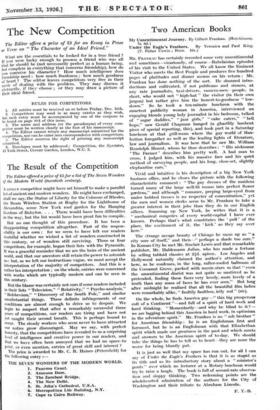Two American Books
Under the Eagle's Feathers. By Veronica and Paul King. (T. Fisher Unwin ; Bonn. 108.) Under the Eagle's Feathers. By Veronica and Paul King. (T. Fisher Unwin ; Bonn. 108.)
Mn. FRANKAU has certainly recorded some very unsentimental and sometimes—vicariously, of course—Rabelaisian episodes of his visit to the United States. We all know the Eminent Visitor who meets the Best People and produces five hundred pages of platitudes and dinner menus on his return : Mr. Frankau has done nothing of the sort. He shunned intro- ductions and cultivated, if not publicans and sinners, at any rate journalists, taxi-drivers, camera-men—people, in short, who would not " high-hat " the visitor (in their own jargon) but rather give him the honest-to-goodness " low- down." So he took a ten-minute luncheon with the smartest publicity woman in America, interviewed an engaging blonde young lady journalist in his bedroom, talked of " sugar daddies," " jazz girls," " cake eaters," " bell hops," saw Gerald Chapman hanged (a ghastlily lambent piece of special reporting, this), and took part in a Saturday luncheon at that grill-room where the gay world of Man- hattan foregather as well as the leading lights of literature, law and journalism. It was here that he saw Mr. William Randolph Hearst, whom he thus describes : " His nickname The Farmer' describes him pretty well. A bad man to cross, I judged him, with his massive face and his quiet method of surveying people, and his long, close-set, slightly elephantine ears."
Vivid and intuitive is his description of a big New York business office, and he closes the picture with the following characteristic comment " The gay dresses of the maidens turned many of the large well-lit rooms into perfect flower gardens," and although " romance, peeping large-eyed from under bobbed tresses is no respecter of concentration," yet the men and women clerks seem to Mr. Frankau to take a greater interest in their jobs than they do in our English offices. Summing up New York, he writes that it is a " mechanical congeries of every world-capital I have ever known. Perhaps that's what constitutes the ' pull' of the place, the excitement of it, the ' kick' as they say over here."
The strange savage beauty of Chicago he stuns up as " a city sure of itself," and then—" perhaps a shade too sure." In Kansas City he met Mr. Sinclair Lewis and that remarkable publisher, Mr. Haldemann Julius, who has made a fortune by selling tabloid classics at 24d. apiece.. Los Angeles and Hollywood naturally claimed the author's attention, and here, as he confesses, in the long, rafter-roofed ballroom of the Cocoanut Grove, packed with movie-stars so that " even the unsentimental diarist was not quite so unstirred as he pretended, finding these faces very lovely, more lovely of a truth than any mass of faces he has ever seen." But long after midnight he realized that all the beautiful film ladies were remarkably alike, " faultily faultless, icily nul " (sic).
On the whole, he finds America gay--" this big prosperous colt of a Continent "—and full of a spirit of hard work and hard thinking. "Momentarily—and why be blind to it ?— we are lagging behind this America in hard work, in optimism in the adventure spirit." Mr. Frankau is no " sob brother" for American friendship : he is an Englishman first and foremost, but he is an Englishman with that Elizabethan spirit which made our greatness in the past and which meets and answers to the American spirit of to-day. We should take the things he has to tell us to heart—they are none the worse for being bluntly put.
It is just as well that my space has run out, for all I can say of Under the Eagle's Feathers is that it is as stupid as its title and as its introductory story about a " minister's pants " over which no lecturer at a Rotary luncheon would try to raise a laugh. The book is full of second-rate observa- tion and sloppy thinking. Two redeeming points are the wholehearted admiration of the authors for the City of Washington and their tribute to Abraham Lincoln.
F. Y.-B.














































 Previous page
Previous page